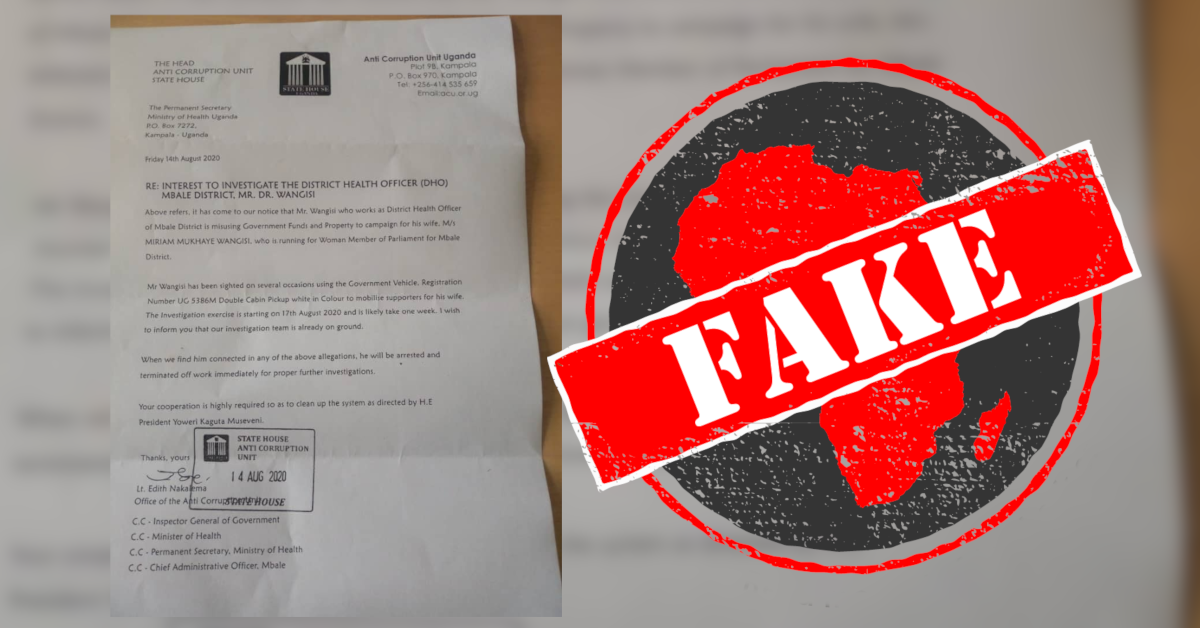A letter that appears to be from the head of Uganda’s anti-corruption unit has been shared on Facebook. According to the letter, the unit has received information about a “Dr Wangisi”, the “District Health Officer of Mbale District”.
It accuses the official of “misusing Government Funds and Property to campaign for his wife. M/s Miriam Mukhaye Wangisi, who is running for Woman Member of Parliament for Mbale District.”
The letter says Dr Wangisi will be arrested and “terminated off work immediately” if the allegations are true.
It is signed by “Lt Edith Nakalema” and has been stamped with what looks like an official “State House Anti Corruption Unit” stamp, dated 14 August 2020.
Uganda is scheduled to go to the polls in early 2021. The letter comes at a time when electioneering is in high gear. Are its contents true? We checked.

The anti-corruption unit is housed within State House Uganda.
The unit is headed by Edith Nakalema, but she is a lieutenant colonel, not a lieutenant as appears in the letter shared on Facebook. It is unlikely that such a senior military officer would get her rank wrong in an official letter.
The unit shared a screenshot of the letter on Twitter, stamped “FAKE NEWS” in red.
They tweeted: “Please ignore this document. It does not originate from our office.” – Grace Gichuhi
It accuses the official of “misusing Government Funds and Property to campaign for his wife. M/s Miriam Mukhaye Wangisi, who is running for Woman Member of Parliament for Mbale District.”
The letter says Dr Wangisi will be arrested and “terminated off work immediately” if the allegations are true.
It is signed by “Lt Edith Nakalema” and has been stamped with what looks like an official “State House Anti Corruption Unit” stamp, dated 14 August 2020.
Uganda is scheduled to go to the polls in early 2021. The letter comes at a time when electioneering is in high gear. Are its contents true? We checked.

‘Ignore document’
The anti-corruption unit is housed within State House Uganda.
The unit is headed by Edith Nakalema, but she is a lieutenant colonel, not a lieutenant as appears in the letter shared on Facebook. It is unlikely that such a senior military officer would get her rank wrong in an official letter.
The unit shared a screenshot of the letter on Twitter, stamped “FAKE NEWS” in red.
They tweeted: “Please ignore this document. It does not originate from our office.” – Grace Gichuhi
Republish our content for free
For publishers: what to do if your post is rated false
A fact-checker has rated your Facebook or Instagram post as “false”, “altered”, “partly false” or “missing context”. This could have serious consequences. What do you do?
Click on our guide for the steps you should follow.
Publishers guideAfrica Check teams up with Facebook
Africa Check is a partner in Meta's third-party fact-checking programme to help stop the spread of false information on social media.
The content we rate as “false” will be downgraded on Facebook and Instagram. This means fewer people will see it.
You can also help identify false information on Facebook. This guide explains how.


Add new comment